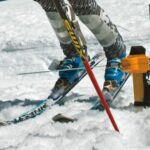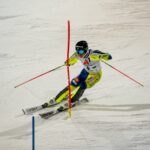The race season is finally over. After a long and demanding winter, you’re probably tired of skiing (regardless of whether the season was a triumph or a disappointment). It’s time to hang up your skis, pack away your gear, kick back, relax, and forget about ski racing for a few months, right? WRONG!!!
Being the best ski racer you can be is not a part-time activity. It requires a year-round commitment and consistent effort in your physical, technical, tactical, and, yes, mental training. If you’re a ski racer serious about achieving your competitive goals, the end of the race season simply means it’s time to start your preparations for next season. After a short period of rest and relaxation, say, a week or two, you need to begin your planning and your training that will get you ready to continue your progress toward your goals next winter.
Evaluate This Past Season
The first thing you want to do is to look back on the recently completed race season and evaluate how you did. Here are 8 essential questions to ask yourself (and your coaches):
- What strengths do you bring forward from this past season that will propel into next season?
- What weaknesses have you identified that you need to improve on?
- What has worked for you that you absolutely want to keep doing?
- What has mostly worked that you may need to fine tune and tweak?
- What hasn’t worked that you want to discard?
- What can you add to your training (physical, technical/tactical, mental) that has been missing?
- How can you innovate in the different aspects of your training to take your skiing to the next level?
- Finally, and specific to my area of expertise, what mental areas do you need to work on to get to the next level?
 With these questions answered, you can, in collaboration with your coaches, decide what in your training worked and what did not. You can then use this information to create an off-season training program to build on your strengths and alleviate your weaknesses, so you will ski that much faster next season.
With these questions answered, you can, in collaboration with your coaches, decide what in your training worked and what did not. You can then use this information to create an off-season training program to build on your strengths and alleviate your weaknesses, so you will ski that much faster next season.
It’s About Preparation
How you ski next season depends on what you do this spring, summer, and fall. The physical conditioning gains you make and the technical, tactical, and mental skills you develop in the off-season will determine how much you improve and whether you reach your competitive goals next winter. There are three areas in which you must focus to maximize your preparation.
First, Commit to an intensive physical conditioning program. Ski racing has become a sport of “beef,” meaning you need muscle, strength, and power (plus, of course, agility and quickness). The only way to develop these areas is with an organized fitness program that may involve weight training, plyometrics, speed work, and stretching.
Second, most highly committed ski racers spend at least part of the summer and fall on-snow. Summer and fall skiing is essential for your technical and tactical development because you’re able to focus exclusively on improvements in your skiing fundamentals without the pressures of getting ready for races. It also enables you to test and adapt to new equipment (though my motto is: “If it ain’t broke, don’t fix it,” meaning if your equipment works for you, don’t mess with it. Testing distracts you from training and can cause you to question which equipment is best for you).
Finally, and just as importantly, the off-season is the best time to engage in mental training. Just like physical conditioning and technical skills, mental aspects of ski racing (e.g., confidence, intensity, and focus) take time and effort to develop. An organized program of mental training can have huge benefits when you enter the new race season. More on mental training next week.
Getting Going
Getting going for next season starts with that first step of deciding how important ski racing is to you. Here are some questions to ask yourself:
- How big are your ski racing goals for next season?
- How hard are your competitors going to be working in the off-season?
- How badly do you want it?!?!
The key to achieving your goals next winter is to start now! Talk is cheap. It’s easy to say you want to be a great ski racer; it’s an entirely different thing to actually do the work necessary. If your goals are at all high, the only chance you will have is to commit to intensive off-season physical, on-snow, and mental training programs. Your goal when you get in the starting gate of your first race next season is to be able to say: “I’m as prepared as I can be to ski my fastest.” And, with all of that hard work in the off-season that you “deposited in the bank,” the chances are you will be successful and reach your goals.
Note: Many thanks to Gabbi Hall at skiracing.com for again giving me the opportunity to share my ideas with the international ski racing community this past winter. It’s hard to believe that I began writing for Ski Racing when it was a printed newspaper in 1984! It’s been great fun meeting new parents, coaches, and racers and reconnecting with those I knew “back in the day.”
Note: This article is updated presentation of a previously article that never gets old.
Want to make mental training a part of your off-season training program? Take a look at my online mental training courses designed just for ski racers.






